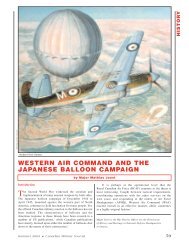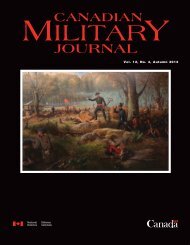MILITARY
CA JOURNAL - Revue militaire canadienne
CA JOURNAL - Revue militaire canadienne
- No tags were found...
You also want an ePaper? Increase the reach of your titles
YUMPU automatically turns print PDFs into web optimized ePapers that Google loves.
Credit: DefenseImagery.Mil photo 111220-FMG591-435 by Senior Airman Perry Aston<br />
Chairman of the Joint Chiefs of Staff General Martin E. Dempsey<br />
from that scandal resulted in one Air Force member reprimanded,<br />
while final decisions are pending on two Navy sailors. 4<br />
Moral leadership not only consists of<br />
ethical beliefs and assumptions, but also<br />
actively and positively supports what is just or<br />
right. Moral decisions must be in consonance<br />
with ethical principles, unselfish, 5 and positively<br />
reflect the Profession of Arms and those<br />
who are the guarantors of the Constitution. 6<br />
Every generation, including this one, must<br />
determine how it will live collectively and<br />
according to what agreed upon values. The<br />
Joint Force’s ability to define and inculcate its<br />
values or code of conduct across the Joint enterprise<br />
is critical to reducing the tension between<br />
competing operational and cultural requirements<br />
and in fully instituting the concept of<br />
mission command.<br />
To achieve Chairman of the Joint Chiefs of Staff (CJCS)<br />
General Martin Dempsey’s vision of mission command, trust must<br />
be the cornerstone of the effort. 7 Without trust, shared understanding<br />
and intent will be nothing more than empty platitudes that are<br />
acknowledged but ignored throughout the joint force. Without<br />
trust, a joint culture will espouse one set of values while acting<br />
upon another. This article posits that to achieve trust, one must<br />
“To achieve Chairman<br />
of the Joint Chiefs of<br />
Staff (CJCS) General<br />
Martin Dempsey’s<br />
vision of mission<br />
command, trust must<br />
be the cornerstone<br />
of the effort.”<br />
begin with an understanding of values—its origins and development,<br />
and the effects of multiculturalism. Next, ethics or valuesin-action<br />
are shown as the linkage between values and trust. Third,<br />
trust is explored as an intervening variable<br />
between a leader and organizational success.<br />
Fourth, leadership as expressed in mission command<br />
is analyzed. Finally, recommendations<br />
are proposed for developing trust throughout<br />
the Joint Force.<br />
Values and Culture<br />
In 1789, Thomas Jefferson wrote to his<br />
old friend, James Madison, that each generation<br />
was sovereign and that the rights and<br />
laws of one generation should not impede or<br />
limit future generations. Thus, each successive<br />
generation must determine through<br />
active measures the laws by which that generation will abide.<br />
Madison acknowledged Jefferson’s logic, but argued that there<br />
is value in stability, and “…without such continuity there is no<br />
nation.” 8 As Madison clearly tells Jefferson, each generation is<br />
not self-contained or purely self-interested; rather each builds<br />
upon the other making improvements to be subsequently<br />
improved upon by later generations. Although Madison’s position<br />
was far more rational and logical, Jefferson’s point was<br />
that actions of past generations should not impede or limit<br />
18 Canadian Military Journal • Vol. 13, No. 4, Autumn 2013





